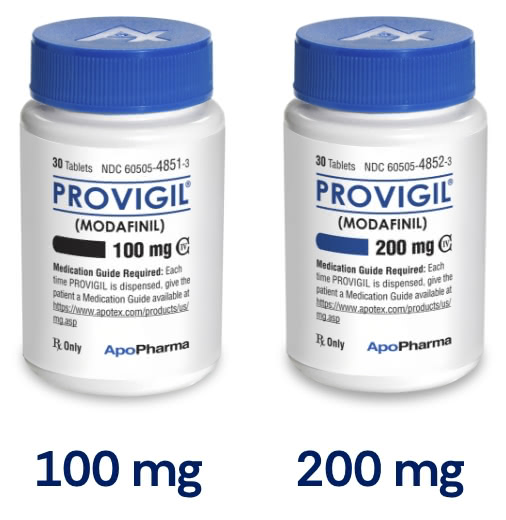

PROVIGIL® (modafinil) Tablets

IMPORTANT SAFETY INFORMATION
CONTRAINDICATIONS
PROVIGIL is contraindicated in patients with known hypersensitivity to modafinil or armodafinil.
DOSAGE AND ADMINISTRATION
The recommended dosage of PROVIGIL for each indication is as follows:
- Narcolepsy or OSA: 200 mg once a day in the morning.
- SWD: 200 mg once a day, taken approximately one hour prior to start of the work shift.
- Severe Hepatic Impairment: reduce dose to half the recommended dose.
- Geriatric Patients: consider lower dose.
WARNINGS AND PRECAUTIONS
- Serious Rash, including Stevens-Johnson Syndrome: Discontinue PROVIGIL at the first sign of rash, unless the rash is clearly not drug-related.
- Angioedema and Anaphylaxis Reactions: If suspected, discontinue PROVIGIL.
- Multi-organ Hypersensitivity Reactions: If suspected, discontinue PROVIGIL.
IMPORTANT SAFETY INFORMATION
CONTRAINDICATIONS
PROVIGIL is contraindicated in patients with known hypersensitivity to modafinil or armodafinil.
DOSAGE AND ADMINISTRATION
The recommended dosage of PROVIGIL for each indication is as follows:
- Narcolepsy or OSA: 200 mg once a day in the morning.
- SWD: 200 mg once a day, taken approximately one hour prior to start of the work shift.
- Severe Hepatic Impairment: reduce dose to half the recommended dose.
- Geriatric Patients: consider lower dose.
WARNINGS AND PRECAUTIONS
- Serious Rash, including Stevens-Johnson Syndrome: Discontinue PROVIGIL at the first sign of rash, unless the rash is clearly not drug-related.
- Angioedema and Anaphylaxis Reactions: If suspected, discontinue PROVIGIL.
- Multi-organ Hypersensitivity Reactions: If suspected, discontinue PROVIGIL.
- Persistent Sleepiness: Assess patients frequently for degree of sleepiness and, if appropriate, advise patients to avoid driving or engaging in any other potentially dangerous activity.
- Psychiatric Symptoms: Use caution in patients with a history of psychosis, depression, or mania. Consider discontinuing PROVIGIL if psychiatric symptoms develop.
- Known Cardiovascular Disease: Consider increased monitoring.
- Pregnancy: Based on animal data, PROVIGIL may cause fetal harm. There is a pregnancy exposure registry that monitors pregnancy outcomes in women exposed to PROVIGIL during pregnancy. Healthcare providers are encouraged to register pregnant patients, or pregnant women may enroll themselves in the registry by calling 1-866-404-4106.
- Ability to Operate Machinery: Although PROVIGIL has not been shown to produce functional impairment, patients should be cautioned about operating an automobile or other hazardous machinery while using PROVIGIL until it is reasonably certain that PROVIGIL therapy will not adversely affect their ability to engage in such activities.
DRUG ABUSE AND DEPENDENCE
Abuse
- In humans, modafinil produces psychoactive and euphoric effects, alterations in mood, perception, thinking, and feelings typical of other CNS stimulants. In in vitro binding studies, modafinil binds to the dopamine reuptake site and causes an increase in extracellular dopamine, but no increase in dopamine release.
- Modafinil is reinforcing, as evidenced by its self-administration in monkeys previously trained to self-administer cocaine. In some studies, modafinil was also partially discriminated as stimulant-like. Physicians should follow patients closely, especially those with a history of drug and/or stimulant (e.g., methylphenidate, amphetamine, or cocaine) abuse. Patients should be observed for signs of misuse or abuse (e.g., incrementation of doses or drug-seeking behavior).
- The abuse potential of modafinil (200, 400, and 800 mg) was assessed relative to methylphenidate (45 and 90 mg) in an inpatient study in individuals experienced with drugs of abuse. Results from this clinical study demonstrated that modafinil produced psychoactive and euphoric effects and feelings consistent with other scheduled CNS stimulants (methylphenidate).
Dependence
- In one placebo-controlled clinical trial, the effects of modafinil withdrawal were monitored following 9 weeks of modafinil use. There were no reported withdrawal symptoms with modafinil during 14 days of observation, although sleepiness returned in narcoleptic patients.
DRUG INTERACTIONS
- Steroidal contraceptives (e.g., ethinyl estradiol): Use alternative or concomitant methods of contraception while taking PROVIGIL and for one month after discontinuation of PROVIGIL treatment.
- Cyclosporine: Blood concentrations of cyclosporine may be reduced.
- CYP2C19 substrates, such as omeprazole, phenytoin, and diazepam: Exposure of these medications may be increased.
ADVERSE REACTIONS
Most common adverse reactions occurring in ≥5% of patients were headache, nausea, nervousness, rhinitis, diarrhea, back pain, anxiety, insomnia, dizziness, and dyspepsia.
To report SUSPECTED ADVERSE REACTIONS, contact Apotex Corp. at 1-800-706-5575 or FDA at 1-800-FDA-1088 or www.fda.gov/medwatch.
Click here for the full prescribing information.